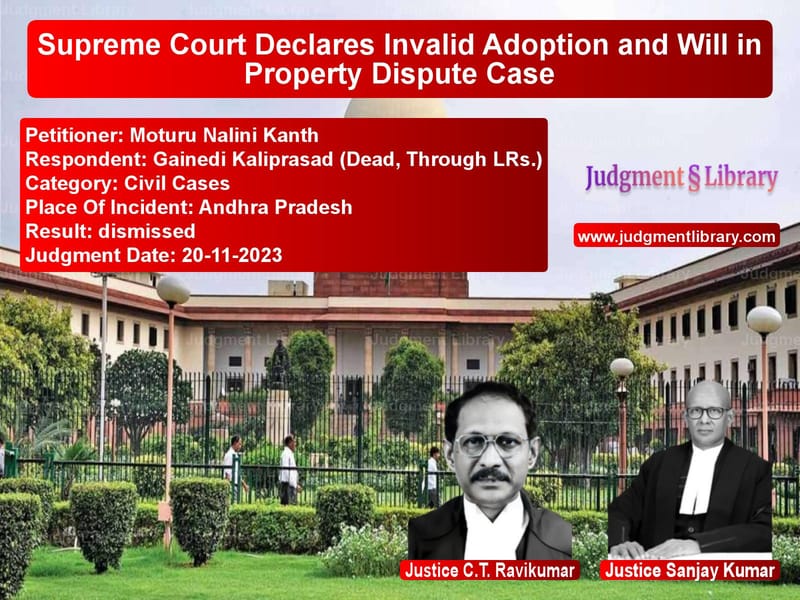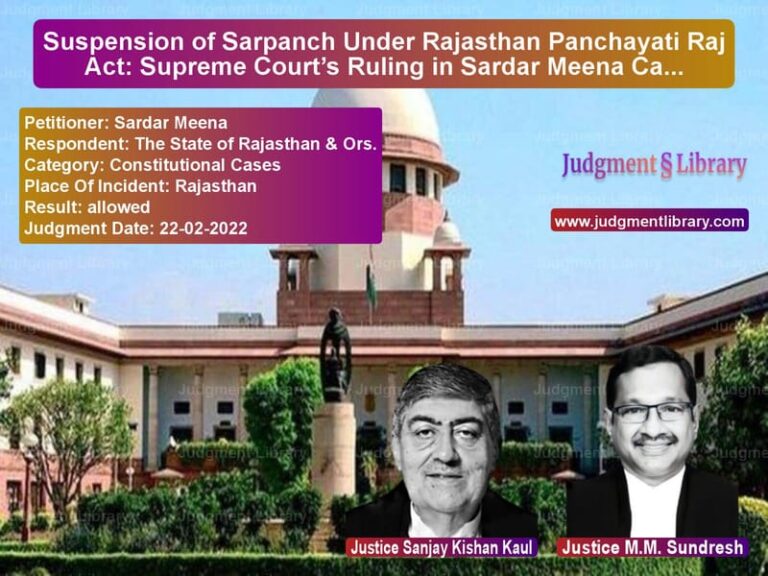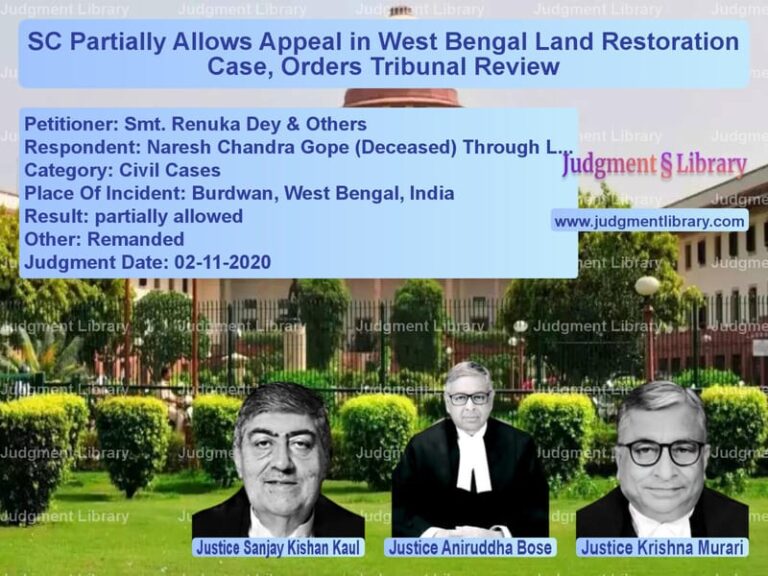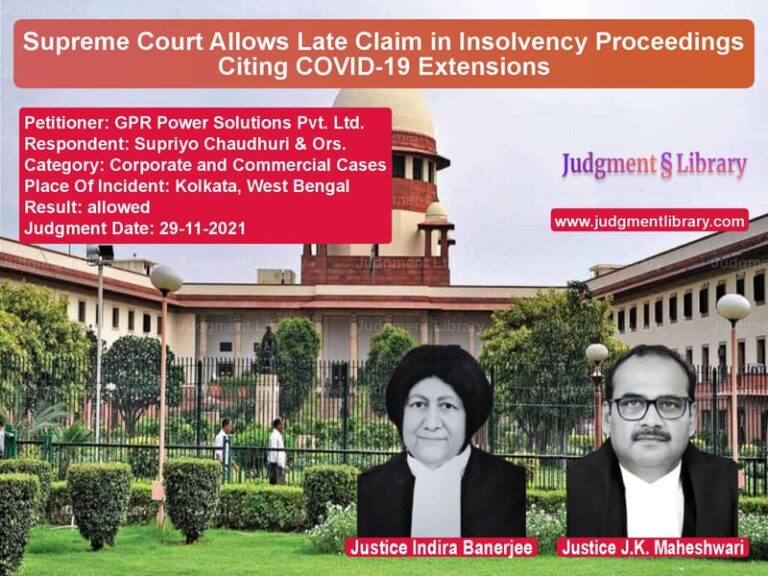Supreme Court Declares Invalid Adoption and Will in Property Dispute Case
The Supreme Court of India recently ruled in a significant property dispute case between Moturu Nalini Kanth and the legal representatives of Gainedi Kaliprasad. The case revolved around the validity of an adoption and a will that determined the rightful heir to the properties of Venkubayamma. The Court ultimately ruled against Nalini Kanth, holding that the adoption and the will were not proved as per the law, and thus, he had no legal right over the disputed properties.
Background of the Case
The dispute arose when Moturu Nalini Kanth, claiming to be the adopted son of Venkubayamma, filed a suit seeking declaration of his title over her properties. He contended that:
- He was adopted by Venkubayamma on 18.04.1982, as per a registered Adoption Deed dated 20.04.1982.
- After the adoption, Venkubayamma executed a registered will on 03.05.1982, bequeathing all her properties to him.
- Venkubayamma passed away on 26.07.1982, making him the legal heir to her properties.
However, this claim was challenged by Gainedi Kaliprasad, the grandson of Venkubayamma through her deceased daughter, Varalaxmi. He contested the authenticity of both the adoption and the will, arguing that:
- Venkubayamma was old and senile in 1982 and did not have the mental capacity to execute the adoption deed or the will.
- He was raised by Venkubayamma, and she always considered him her sole heir.
- The documents presented by Nalini Kanth were fabricated and did not meet the legal requirements for proving adoption and will execution.
Trial Court and High Court Findings
The trial court ruled in favor of Nalini Kanth, accepting the validity of the adoption and the will. However, on appeal, the High Court of Andhra Pradesh reversed this decision, declaring that:
- The adoption deed was not sufficiently proved.
- The execution of the will was surrounded by suspicious circumstances.
- The adoption and will were invalid, making Kaliprasad the rightful heir.
Arguments by the Petitioner (Moturu Nalini Kanth)
The counsel for the appellant, Nalini Kanth, argued that:
- The adoption was conducted following all Hindu traditions and was documented in a registered deed.
- As per Section 16 of the Hindu Adoptions and Maintenance Act, 1956, a registered adoption deed carries a presumption of validity.
- The will was executed in a sound state of mind and was registered, making it legally enforceable.
- The High Court erred in rejecting these legally registered documents without adequate proof of fraud.
Arguments by the Respondents (Heirs of Gainedi Kaliprasad)
The respondents countered these claims, arguing that:
- There was no evidence to prove the ceremony of giving and taking in adoption, which is a legal necessity under Hindu law.
- Several discrepancies existed in the documents, such as inconsistencies in the place of adoption and conflicting statements from witnesses.
- The woman appearing in the adoption photographs was not identified as Venkubayamma, raising doubts about their authenticity.
- The will was not attested as per Section 63 of the Indian Succession Act, and its execution was surrounded by suspicious circumstances.
Supreme Court’s Key Observations
The Supreme Court examined the validity of both the adoption and the will. The Court made several key observations:
- The adoption deed, though registered, lacked proof of the essential requirement of giving and taking in adoption.
- Photographs provided as evidence of the adoption ceremony were unconvincing, as they did not clearly establish the presence of Venkubayamma.
- The adoption ceremony allegedly took place in a temple, but another document mentioned that it happened at the residence of the natural parents, creating contradictions.
- The will was not attested in accordance with Section 63 of the Indian Succession Act, and the attesting witnesses were either unavailable or failed to provide consistent statements.
- The will completely excluded Kaliprasad, despite him being raised by Venkubayamma and having a long-standing relationship with her, making it highly suspicious.
Key Excerpt from the Judgment
“The execution of the will is surrounded by suspicious circumstances… unless satisfactorily discharged, Courts would be reluctant to treat the document as the last Will of the testator.”
The Court emphasized that mere registration does not validate an adoption or a will unless due execution and compliance with legal formalities are demonstrated.
Final Judgment and Directions
The Supreme Court ruled as follows:
- The adoption deed was not legally proved, and the presumption under Section 16 of the Hindu Adoptions and Maintenance Act was rebutted.
- The will was invalid as it failed to meet the legal attestation requirements.
- The judgment of the High Court was upheld, and Moturu Nalini Kanth’s claims were rejected.
- The properties of Venkubayamma would devolve upon Gainedi Kaliprasad as her rightful heir.
The ruling reinforces the importance of strict legal compliance in matters of inheritance, adoption, and will execution. It also highlights the necessity of providing clear, convincing evidence to establish claims in property disputes.
Petitioner Name: Moturu Nalini Kanth.Respondent Name: Gainedi Kaliprasad (Dead, Through LRs.).Judgment By: Justice C.T. Ravikumar, Justice Sanjay Kumar.Place Of Incident: Andhra Pradesh.Judgment Date: 20-11-2023.
Don’t miss out on the full details! Download the complete judgment in PDF format below and gain valuable insights instantly!
Download Judgment: moturu-nalini-kanth-vs-gainedi-kaliprasad-(-supreme-court-of-india-judgment-dated-20-11-2023.pdf
Directly Download Judgment: Directly download this Judgment
See all petitions in Succession and Wills
See all petitions in Property Disputes
See all petitions in Specific Performance
See all petitions in Contract Disputes
See all petitions in Judgment by C.T. Ravikumar
See all petitions in Judgment by Sanjay Kumar
See all petitions in dismissed
See all petitions in supreme court of India judgments November 2023
See all petitions in 2023 judgments
See all posts in Civil Cases Category
See all allowed petitions in Civil Cases Category
See all Dismissed petitions in Civil Cases Category
See all partially allowed petitions in Civil Cases Category







